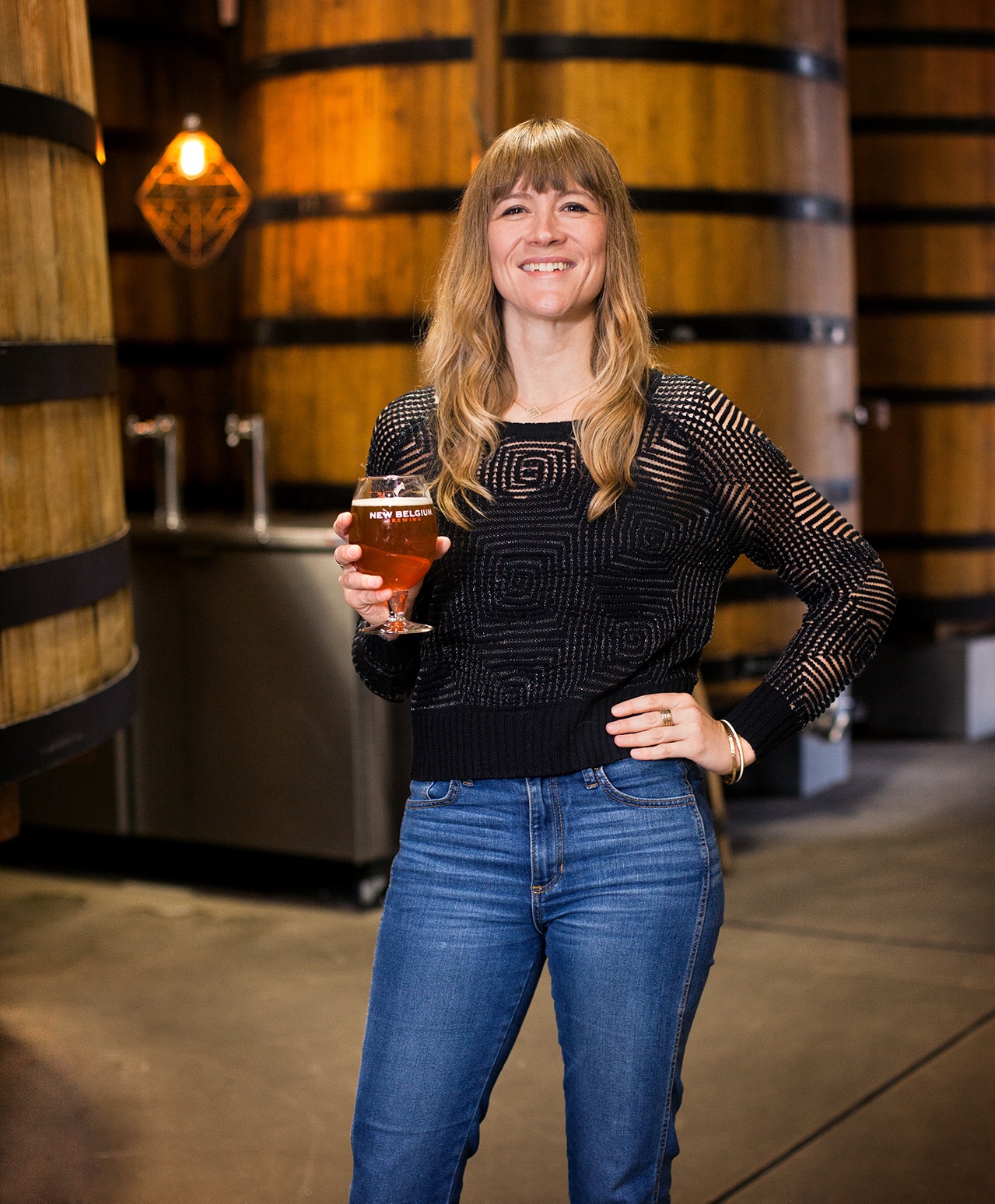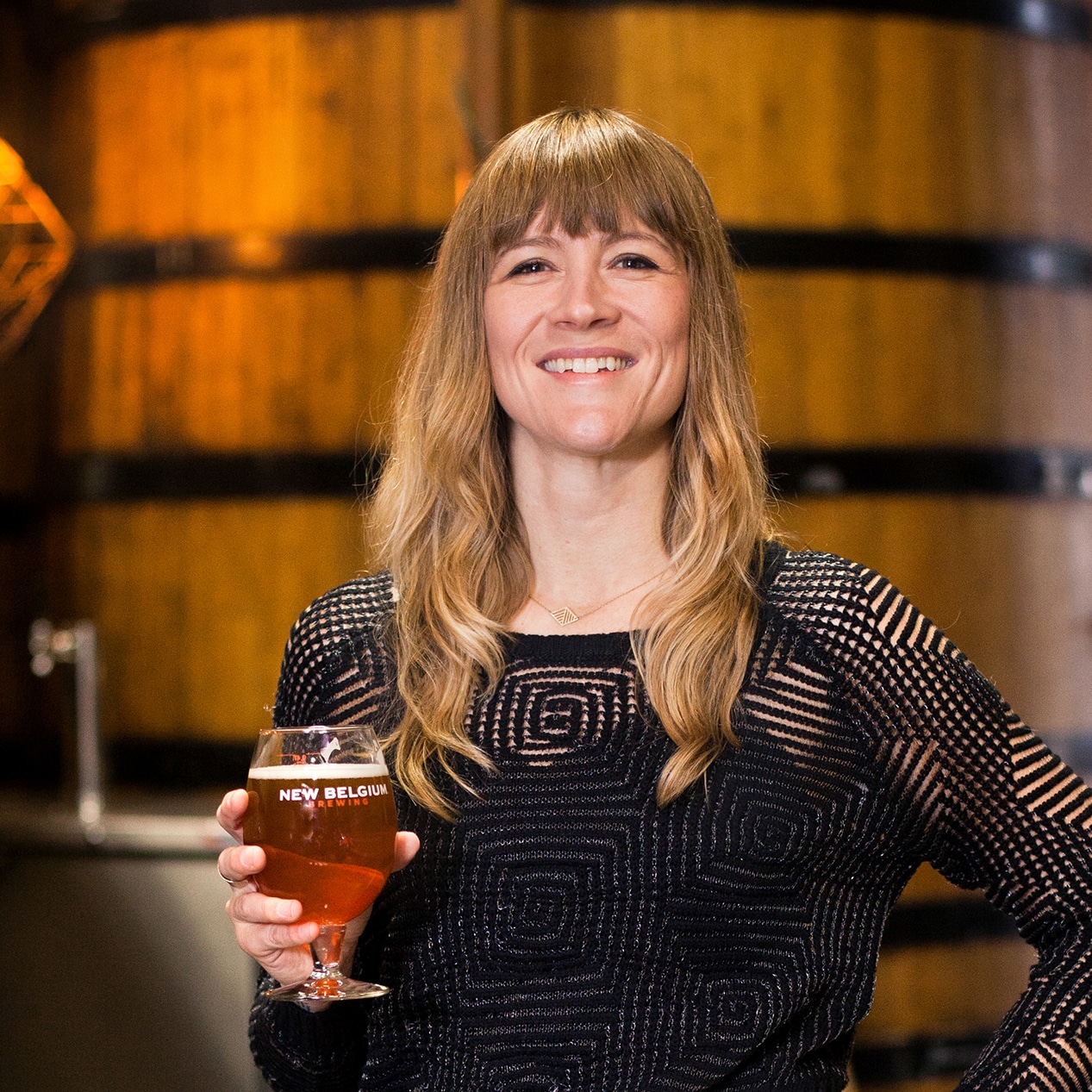
[Photo: Courtesy of New Belgium Brewing]
Sustainability is core to the mission at New Belgium Brewing Company, where a cold beer depends on good water and healthy soil.
“I get it. When I’m opening a beer, I also don’t want to think about climate change,” says Katie Wallace, director of social and environmental responsibility at New Belgium Brewing Company. “Beer is a place where we relax and forget about the world’s problems.”
But beer relies on a stable climate, as it’s more than 90% water, and it also depends on healthy soil to grow barley and hops. Fort Collins, Colorado–based New Belgium may make less than 0.5% of the beer sold in the U.S., but the 100% employee-owned brewery is making big moves in the area of sustainability.
New Belgium—which also has a brewery in Asheville, North Carolina—aims to be carbon neutral by 2050. The B Corp (B Corps are certified by the nonprofit B Lab to meet rigorous standards of social and environmental performance, accountability, and transparency) is currently diverting 99.9% of its waste from the landfill and is a Platinum-certified Zero Waste Business. In 2016, New Belgium found a way to compost organic material collected at its process water treatment plant, which resulted in a great reduction in their total waste to landfill. “We’re increasing operational efficiencies, we’re trying to push the needle in our supply chain, and we’re asking our elected officials to let the market react to the science,” Wallace says.
The brewery knows good water makes good beer—and hoppy beers may require even more water. New Belgium’s water comes from the Cache la Poudre and Colorado rivers in Fort Collins and the countless streams that feed a 20,000-acre watershed in Asheville. As such, the brewery is committed to making sure those rivers and streams are protected. Currently, New Belgium’s water use ratio hovers around 4:1 (barrels of water per barrel of beer), but they’re striving for a 3.5:1 ratio as they emphasize production improvements and continue testing the reuse of treated process water for industrial applications in Fort Collins. “As we ramped up production at our new brewery in Asheville, we knew our water use ratio would struggle until we filled out our capacity. The ratio is already improving, and we have our eyes on the prize to achieve a 3.5:1 ratio by 2020.”
We recently sat down with Wallace to find out why sustainability is such a core part of the mission at New Belgium, and just how they’re making these changes happen.
Tell us about the sustainability team at New Belgium.
We are a team of four, working full-time on social and environmental projects. Each of us is a generalist to a degree, and we also have our specialties like operational efficiency, supply chain activism, policy advocacy, philanthropy, and so on. But we like to say everyone at New Belgium works in sustainability. We have so many coworkers who bring our values to life in their daily work. We wouldn’t be successful without them. Our recruiting manager, Justin, is a driving force behind our diversity project. Kristin, our Beer Ranger (sales rep) in Arizona, started a reusable straw project for our daily quality checks at bars and restaurants. I didn’t even know we used straws for quality checks! Everyone sees a different angle of the business, and ultimately we want all of our coworkers integrating sustainability into their jobs. Our team dedicates a good amount of time to supporting, educating, and empowering champions across the company.
But whether engagement is high or low, I’m still a strong advocate for a centralized sustainability team. It’s too easy to lose sight of this work as other business pressures heat up, even for those who have the best intentions. Having a team that understands the nuances of sustainability, that can work across all departments, and ensure we’re tending to these long-term, large-scale goals is essential.
But what does climate change really have to do with beer production?
Every ingredient of beer has been impacted by weird weather patterns over the last few years. These aren’t new issues, but they are increasingly frequent and severe, and they’ll eventually impact price and availability on this trajectory. Beer is over 90% water, and droughts are becoming more frequent as the global temperatures rise. Some breweries in California were told to scale back production during severe droughts. The quality and quantity of barley crops suffer in droughts. And too much moisture is a problem as well. Unusually warm and wet harvest seasons have caused barley to sprout prematurely on the field, rendering it useless for malting.
We’re working to reduce greenhouse gases because they’re a risk to our business. But of course we have a much broader look on climate change. We see the impacts it’s having on the food system, on coastal communities, on the marginalized and voiceless. As carbon polluters, we also have a responsibility to others to reduce our footprint. Our goal is carbon neutral by 2050. We’re increasing operational efficiencies, we’re trying to push the needle in our supply chain, and we’re asking our elected officials to let the market react to the science.
What about other efforts there? How is New Belgium reducing its carbon footprint?
We are certified as a Platinum level zero waste business by TRUE Zero Waste. That title always confuses me since we still send waste to the landfill. It is minimal, though—99.8% of our waste (by weight) is recycled, composted, or sold as a byproduct. Spent grain from the brewing process has nutritional value, so it’s sold to cattle farmers. We go through a lot of effort to separate our recyclables and find a good home for them. It’s worth the effort. Separating always increases value, and at the end of the day we make more money than we spend on waste management at New Belgium. It’s an excellent triple bottom line win.
How do you source your materials?
Packaging and ingredients are our number one climate impact. They account for 67% of our annual greenhouse gas emissions. Unfortunately, as a small brewery, we can’t just walk into a supplier and tell them to change. And there aren’t many suppliers to choose from as it is, so options are limited. We still work with our vendors to improve their practices, and we evaluate them annually. But to really make a difference as a small company, we have to poke at these broader supply chain issues in a creative way. Take, for instance, glass bottles.
The higher the recycled content of glass bottles, the lower the greenhouse gas emissions. Bottle bills (5 or 10-cent deposit) undoubtedly recycle the most glass. But they aren’t in every state, and there is a frustrating amount of opposition to them. We still support deposits, and we work through other channels to increase recycling. A few years ago, we cofounded the Glass Recycling Coalition to increase cullet (recycled glass) across the U.S. and eventually, hopefully in our own beer bottles. Glass is infinitely recyclable and bottles can contain over 95% recycled content. It’s a wonderful material for the circular economy, but it’s terribly underutilized. Recycled content averages around 33% in the U.S. We need to fix the collection system so recycling is more economically viable, and the Glass Recycling Coalition convenes the entire value chain to solve these issues together. That said, the most drastic greenhouse gas reduction will come from refillable bottles. The state of Oregon’s new refillable program is revolutionary.
How can companies collaborate?
Policy. Voluntary carbon reduction is great and we’ll still pursue it. But the science clearly shows that’s not enough. I’m convinced the only way to draw down greenhouse gases sufficiently is through policy. It’s been successful across the world, and the U.S. needs to step up to be the leader many Americans believe us to be. Business has the strongest voice with politicians, whether we like that or not. Our collective voice will change history, and this isn’t a time to be shy about politics. Many businesses are catching on to this, and I think it’s our best chance to make a difference. If you’re a business, join Businesses for Innovative Climate and Energy Policy (BICEP) for the best updates and join thousands of other businesses as a We Are Still In signatory.
Who else is New Belgium working with?
We work with dozens of organizations, and as a relatively small company, we’ve found the most success within broader coalitions. In the policy arena, we’ve been able to do great work with BICEP, elevating our influence in the policy world far beyond anything our size would suggest. We’re also on the Leaders Circle of We Are Still In and work with several other advocacy groups to lend the playful platform of beer to one of the most critical movements of our time.
Local policy has been a fertile ground as well. The city of Fort Collins has been an excellent partner; we’ve worked with them to green our grid over the last few years through the Climate Action Committee. From 2016 to 2017, they reduced the emissions factor of our electricity by 21%. In October, the city adopted a goal of 100% renewable electricity by 2030, which will do far more to reduce our environmental impact than anything we could have done alone on our own site. We’re also very excited about our philanthropic partnerships with GRID Alternatives and Back Country Hunters and Anglers (BHA). GRID works with state incentives and private donors to install solar in low-income communities that have terrible air quality as a result of fossil fuels. And they give community members job training and experience. BHA is doing inspiring work to mobilize hunters and anglers to protect public lands. After all, it’s hunting and fishing licenses that fund the maintenance of many public lands and enable the lands to stay public. BHA is building bridges with other outdoor sports, like those represented through the Conservation Alliance. We all share the same passion for protecting the land and together we can be a powerful force. We bring the beer and BHA brings the conversation.
How do you choose who to work with?
When it comes to hops, we have options; we often go with a vendor because they’re certified Salmon-Safe and improving on-farm sustainability. A brewery of our size, though, doesn’t have many options for barley and packaging vendors. We’re the fourth largest craft brewery, but we’re still less than 0.5% of beer sold in the U.S. We’re a small fish in a large pond with a very consolidated supply chain. Our best bet is to work with our existing suppliers to push progress from the inside. We evaluate the sustainability practices of our primary vendors that comprise 80% of our annual spends. Luckily they’re increasingly pushed by bigger customers and are seeing the business value of sustainability. We are seeing some progress, and as small as we are, I do think our efforts have contributed to this progress.
We can do more with a broad coalition of brands. That’s why we cofounded the Glass Recycling Coalition to increase recycled content and decrease greenhouse gas emissions. I see the Brewers Association (BA) as the best vehicle to push sustainability in barley and hop farming. We have some progress to make there, and as co-chair of their sustainability committee, I’m hopeful the BA can grow this work.
What does the future hold for the industry?
Beer is facing challenges as the climate changes, but I have to believe we will prevail. Beer has been bringing people together for thousands of years, and as long as humans are on this Earth, surely beer will be here, too. When it’s consumed responsibly, it can be a really special part of our lives. We’re creative and innovative, arguably even more so over a couple of beers.

